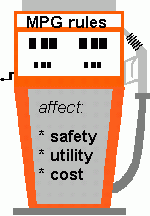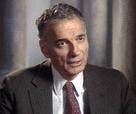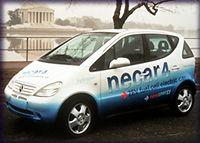Michael Fumento
Factual · Powerful · Original · Iconoclastic
The High Cost of Cleaner Cars
January 01, 2010 · Michael Fumento · Investor’s Business Daily · EconomyIts supporters say it will reduce pollution, decrease America’s dependence on foreign oil and create jobs.
But opponents, such as Sam Kazman, an attorney at the Competitive Enterprise Institute in Washington, call it "a costly and lethal solution in search of a problem."
The subject is CAFE, a regulation automakers must follow.
CAFE stands for corporate average fuel economy. It requires all companies selling cars in the U.S. to have a certain fleet average of miles per gallon.

CAFE was enacted by Congress in 1975 and took effect in 1978. The law mandated a gradual increase in the average fuel economy of each automaker’s fleet until it reached 27.5 mpg by 1985, although it gave authority to the National Traffic Health and Safety Administration (NTHSA) to modify the standard.
The CAFE standard may be raised by order of the president. During the presidential campaign, President-elect Clinton said he supported raising the CAFE standard to 45 mpg by the year 2000. However, he later said he supported such a move only if it was technologically feasible.
Both sides in the debate seem to believe that Clinton will do right by them. Vice President-elect Al Gore, however, who may play an important role in determining environmental regulations, strongly supports CAFE.
Ford Motor Co. and General Motors Corp. have bitterly opposed raising the standards, while Chrysler Corp. has given its support to some level of increase.
Foreign carmakers in the U.S. have registered opposition to a bill introduced this year by Sen. Richard Bryan, D-Nev., which would have lifted CAFE standards even further, as well. A Toyota Motor Corp. spokesman said the Bryan bill would mean "we’re nothing but a Tercel company again."
The United Auto Workers also rejected the rise to approximately 40 mpg the Bryan bill would have required, and was instrumental in defeating earlier legislation that would have raised the standard, claiming it would cost jobs.
The original impetus for CAFE was the Arab oil embargo in 1973, with the resulting jump in oil and gasoline prices. Policymakers waxed anxious over the increasing percentage of petroleum consumed by Americans that came from overseas and over forecasts of $3-a-gallon gasoline.
But gasoline prices, adjusted for inflation, have declined since the 1970s. Now, despite recent tax increases, gas prices are as low as they were before the embargo and much lower than they were the decade before that. This is despite one of the world’s major oil producers, Iraq, being kept off the market.
Estimated petroleum reserves are now three times what they were in 1970. Arab countries now account for only one-sixth of our oil and 4% of our primary energy. Further, the Persian Gulf War showed that the U.S. is highly capable of defending its foreign oil supply lines.
In short, the U.S. is a nation awash in cheap fuel, and there’s no end in sight. Yet, the U.S. is not getting drunk on it.
According to the Department of Energy, average gasoline consumption today, at 300 million gallons a day, is slightly lower than it was in 1978 — even though there are 50 million more cars and trucks on the road today.
Part of the decline in gasoline consumption may be attributable to CAFE. Yet, critics of the CAFE standard say the current national average also provides fuel for their argument that it doesn’t need to be raised further.
"Why is it that with U.S. cars using no more gasoline than they did fourteen years ago, when there were 50 million fewer vehicles on the road than there are today, it’s necessary for them to burn even less fuel?" asked Wayne Brough, an economist with Citizens for a Sound Economy in Washington.
Further notes Brough, "Reducing the demand for fuel lowers the price, which means marginal suppliers of the fuel will be falling out of the market."
Noting that domestic oil costs more on average to pump than imported oil, he said, "That means the American oil companies will be forced out and our use of — or ’dependence on’ — foreign oil will increase."
One major plus of a higher CAFE according to its proponents is reduced pollution. Yet, the anti-pollution benefits are not as clear as one might think.
According to Donald Stedman, a University of Denver professor of atmospheric chemistry, better mileage only cuts certain types of emissions.
"For carbon dioxide (emissions), it’s superb," he said, "It’s a one-to-one relationship."
The problem is, a lot of scientists don’t consider carbon dioxide — which all animals exhale — to be a pollutant. If one does not accept the theory of global warming, which many scientists don’t, then carbon dioxide is relatively harmless.
But, Stedman said other types of emissions that are known to cause health problems are controlled to 99.9% of what goes in, and the tiny fraction of what is left to exit the tailpipe has to do with the exhaust system, not the car.
Some question how much fuel CAFE will save.
Robert Crandall, an economist with the Brookings Institution in Washington, notes that more fuel-efficient cars will lead to more driving since the cost of car travel will go down, thereby using up some of the fuel CAFE would otherwise save.
"It’s even possible that increasing CAFE would ... lead to no savings," he said.
But if the upside of CAFE isn’t what it is touted to be, the regulation has a definite downside.
"Quite simply," said CEI’s Kazman, "CAFE kills people, and not a single one of its advocates has the guts to admit this."
The reason, he says, is that while automakers have improved fuel efficiency through such technological advances as more efficient engines and reduced-friction tires, much of the improvement in mileage came simply from downsizing their fleets — selling fewer large cars and more small cars.
Numerous studies show that small cars are more dangerous than large ones. One such study was conducted by Brookings’ Crandall and Harvard professor John D. Graham.
"We found strong evidence that vehicle weight and safety are correlated," said Crandall. "We found that in the 1989 model year, CAFE reduced the weight of cars by 14%, but that led to a 14% to 20% increase in fatalities in that model year’s car."
Just the lower end, the 14% increase, would represent 2,200 deaths over the lifetime of these cars, along with 11,000 serious injuries.
CAFE proponents have alleged that much of the relative danger of small cars comes about because of their disadvantage in collisions with larger cars and that as the fleet downsizes there will less danger, because there will be fewer large cars on the road.
Yet, a 1989 NHTSA report found that the likelihood of driver injuries in single car non-rollover accidents increased as vehicle weight decreased.
While consumer activist Ralph Nader’s Center for Auto Safety is in the forefront of the right to raise standards, in the years before CAFE, the group repeatedly noted that small cars were less safe than large ones.

Nader: unsafe at any speed.
CAFE proponents such as the Nader group now say that safety features such as air bags can make small cars as safe as larger ones without those features.
But Adrian Lund, vice president for the Insurance Institute for Highway Safety in Arlington, Va., said, "While you can improve occupant protection in small cars, the same technology can protect them in large cars even further. So, you’ll always have more ability to protect them in the larger car."
The CEI took the NHTSA to court, charging that the agency had engaged in a cover-up of the safety problems of CAFE and that it refused to take them into account in deciding where to set the standard.
The U.S. Court of Appeals in the District of Columbia agreed with CEI, ordering NHTSA to consider the safety question. The court accused NHTSA of "papering over the issue" of safety and concluded it had "fudged the analysis" of how many lives would be "sacrificed" to CAFE.
"There’s bloody irony in a safety agency refusing to admit that one of its programs kills people," said Kazman.
Another hotly contested issue is jobs.
According to Motor Vehicle Manufacturers Association (MVMA) calculations, anywhere from 159,000 to 315,000 jobs would be lost in the industry with an increase to 40 mpg, depending on such things as the cost of gasoline and Detroit’s ability to take a larger segment of the small car market.
These losses are mainly due to Japan’s higher level of competitiveness in the small-car market. In addition, technology to reduce fuel consumption increases the cost of a new car, forcing would-be buyers to hold onto their present cars longer.
But one pro-CAFE group, the American Council for an Energy-Efficient Economy (ACEEE), has countered that CAFE would actually increase jobs. It would do so by saving money spent on oil — much of which is from overseas — and plowing it into other purchases, including cars.
For this reason, it says 1.1 million new jobs could be created by 2010, including many in the auto industry.
But Crandall believes that both sides are exaggerating the job effects.
"I think jobs will be lost within the auto manufacturing industry," he said, "but that is not to say jobs will be lost in the overall economy."
Over the past few years, there has been no increase in domestic average fuel economy, currently at an estimated 26.9 mpg. There has actually been a decrease in that of imports.
The decrease in the average fuel economy of imports, according to industry analysts, results from foreign manufacturers, particularly the Japanese with their new luxury divisions, taking over part of the market the American companies were forced to abandon due to CAFE.
As to the flattening of the domestic average, MVMA spokesman Mike Stanton blames part of it on added safety equipment, which makes vehicles heavier.

As is so often the case, wallets will be the first to suffer.
"There is lost efficiency associated with Clean Air Act standards," Stanton said. "So, just to keep even we’ve got to make progress."
The other problem, he said, is that with gasoline prices so low, very few people want fuel-efficient cars.
"We never said we couldn’t do it," said Stanton of the proposed increase in CAFE. "The proof is we have cars that exceed 40 right now. The problem is that only 2% of the public want to buy them."
When Honda Motor Co. announced its new VTEC-E engine-powered Civic VX using "lean-burn" technology that got 55 mpg, the media and environmentalists seized on it to prove that Detroit was essentially lying, when it said it couldn’t quickly move up to 40 mpg for the fleet.
But the American Honda Motor Co. said that, of about 200,000 Civics the company will sell this year, only 15,000 will be VXs. Further, the VX sold in California does not use the lean-burn engine because its higher emissions would violate that state’s tough pollution standards.
Said a Honda spokeswoman, "This is not the magic bullet to get us to 40 miles per gallon for all our cars." She added that even with the VTEC-E engine, the company expects to see only a 10% overall fuel-economy gain for its total U.S. fleet by 2001.

Great mileage, but poor survivability if hit by anything larger than a bicycle.
Detroit continues its research to improve fuel efficiency, including pouring money into developing a two-stroke engine, which saves energy by cutting in half the number of strokes of conventional engines. So far, however, those engines have been plagued by problems of durability and high emissions.
Earlier this year, the National Academy of Sciences issued a report concluding that only a small improvement in average fuel efficiency to 31 to 33 mpg is feasible by the year 2000, and even that would cost $500 to $2500 per vehicle.
The report also concluded that a 34 to 37 mpg range would be possible with a 10% fleet weight reduction, but cited the possibility of reduced safety.
However, John DeCicco, a research associate at ACEEE, disagrees with the NAS report.
"Basically, they used an assessment I would characterize as misleading in their analysis, lowball estimates of levels of technological improvement available, (and) overestimates of cost," he said.
Yet, whatever the improvements in efficiency, there remain tradeoffs between horsepower, size, and mileage.
Engines today get far more power out of a gallon of gas than they did a decade ago. But increases in engine efficiency can be applied either to improved mileage or increased power, and consumers have been choosing power.
"Performance is the name of the game. People are asking for it," said Tom Dukes, an analyst at the automobile market research firm J.D. Power and Associates.
DeCicco doesn’t deny that, but says that customers are asking for more horsepower than they need.
DeCicco says that bringing acceleration times down to what he considers a reasonable level would allow a 60% increase in national fuel economy. "An acceleration time of about 18 seconds (from zero to 60) is adequate for safety, and we’re not even talking about that kind of a tradeoff," he said.
DeCicco estimates that a range of 14-15 seconds from zero-to-sixty would probably be required to meet the higher CAFE standard, compared to a fleet average of 12.0 for cars and light trucks for 1991, according to the U.S. Environmental Protection Agency.
Fleet figures for 1992 are not available, but they will be significantly lower. By comparison, the Honda Accord EX does zero-to-60 in 9.8 seconds, the Ford Taurus LX in 9.4, the Ford Taurus SHO in 6.8, the Cadillac STS in 8.4, and the Chrysler New Yorker Fifth Avenue in 11.0.
Said DeCicco, "I think new car performance is higher than the public really needs. It’s rational for public intervention in this case."
Patrick Bedard, an editor at Car and Driver magazine, disagrees.
"My only answer to that is the American philosophy is not about need, it’s about a want to better ourselves in every way. For someone to stand on the sidelines and say we don’t need something, I can hardly think of anything more un-American than that."
Brookings’ Crandall isn’t a car enthusiast, but he’s as unenthusiastic about CAFE as Bedard.
Crandall, like many other economists, thinks that a hike in gasoline taxes — though unpopular — would accomplish everything CAFE sets out to do. It would immediately affect all cars and wouldn’t force people to hold onto old cars because they couldn’t afford new ones.
Said Crandall, "Regulation has greatly reduced the demand for cars. Regulations have kept old cars on the road longer and these are less safe, less fuel efficient, and more polluting."
